Visa Traveler
Exploring the world one country at a time

How to Apply for Turkey e-Visa: A Step-by-Step Guide
Updated: October 19, 2023 8 Comments
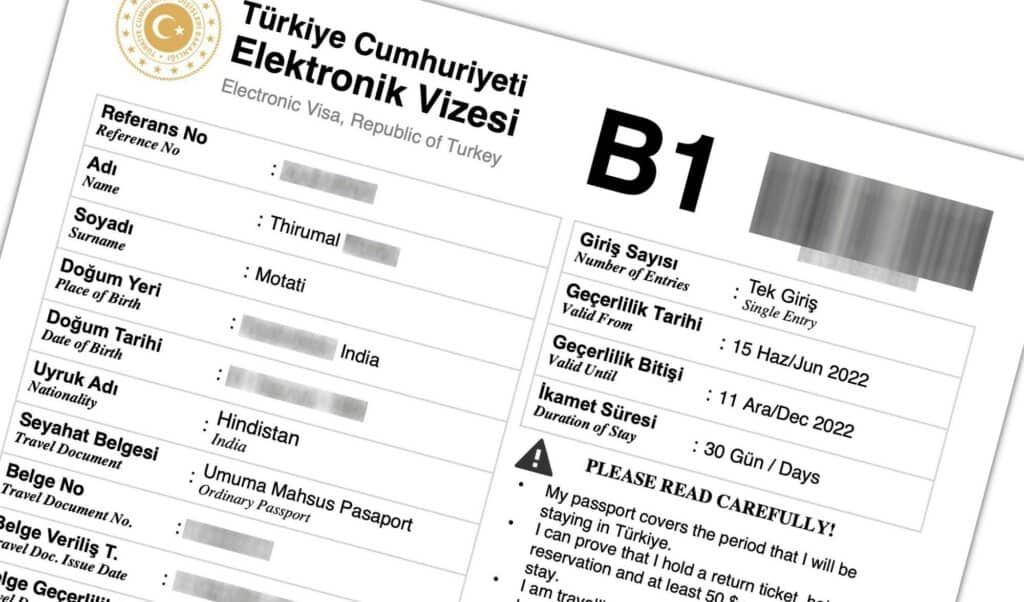
Turkey e-Visa is super easy to apply. It only takes 5 minutes to complete the application and the approval is immediate.
Turkey e-Visas are valid for 180 days. They can be single-entry or multiple-entry depending on the passport. The permitted stay can be 30 days or 90 days depending on the passport.
Many nationalities that otherwise require a Turkey visa from the embassy can apply for a Turkey e-Visa if they hold a US, UK, Ireland or Schengen visa or residence permit.
For this article, we will focus mainly on those with weak passports that otherwise require a consular visa for Turkey.
Table of Contents
Nationalities eligible for turkey e-visa, 90-day multiple-entry.
- Antigua and Barbuda
- Dominican Republic
- St. Vincent and the Grenadines
- Saudi Arabia
- United Arab Emirates
- United States
30-day multiple-entry
30-day single-entry.
- Egypt (under 20 or above 45 years age)
- South Africa
- Timor Leste
30-day single-entry with a US, UK, Ireland or Schengen visa or residence permit
- Afghanistan
- Algeria (those aged 15-18 and 35-65)
- Equatorial Guinea
- North Korea
- Philippines
NOTE For this article, we will focus on the above 19 nationalities that can obtain a Turkey e-Visa with a US, UK, Ireland or Schengen visa or residence permit.
Passport validity required for Turkey e-Visa
Your passport must be valid for at least 6 months (180 days) from your intended day of arrival in Turkey. You can simply add 180 days to your intended arrival date in Turkey to calculate the passport validity required.
Here is an example.
Your intended arrival date in Turkey is 10 Nov 2022 Your Turkey E-Visa will be valid from 10 Nov 2022 to 08 May 2023 (180 days) Your passport must be valid at least until 08 May 2023 (180 days or 6 months)
Turkey e-Visa validity
Turkey e-Visa is issued for 180 days, single-entry only. You must enter Turkey within the validity of your e-Visa. Upon your entry, you will be granted a 30-day stay.
The e-Visa validity starts from the “arrival date” that you enter in your application.
Your Turkey E-Visa is valid from 10 Nov 2022 to 08 May 2023 (180 days) You plan to arrive in Turkey on 28 Nov 2022 You must exit on or before 27 Dec 2022 (max 30 days)
Documents needed before starting
Before starting your Turkey e-Visa application, have these documents ready.
- Passport must be valid for at least 6 months from the day of arrival in Turkey
- A valid visa from the US, UK, Ireland or Schengen
- A credit or debit card for visa fee payment
Word of caution on Turkey e-Visa fake websites
There are many Turkey e-Visa fake websites posing as “official websites” and charging astronomical prices. Do not fall prey to such scams.
There is ONLY one Turkey e-Visa OFFICIAL website. The URL is below.
Turkey e-Visa OFFICIAL website: https://www.evisa.gov.tr/en/
Steps for Turkey e-Visa application
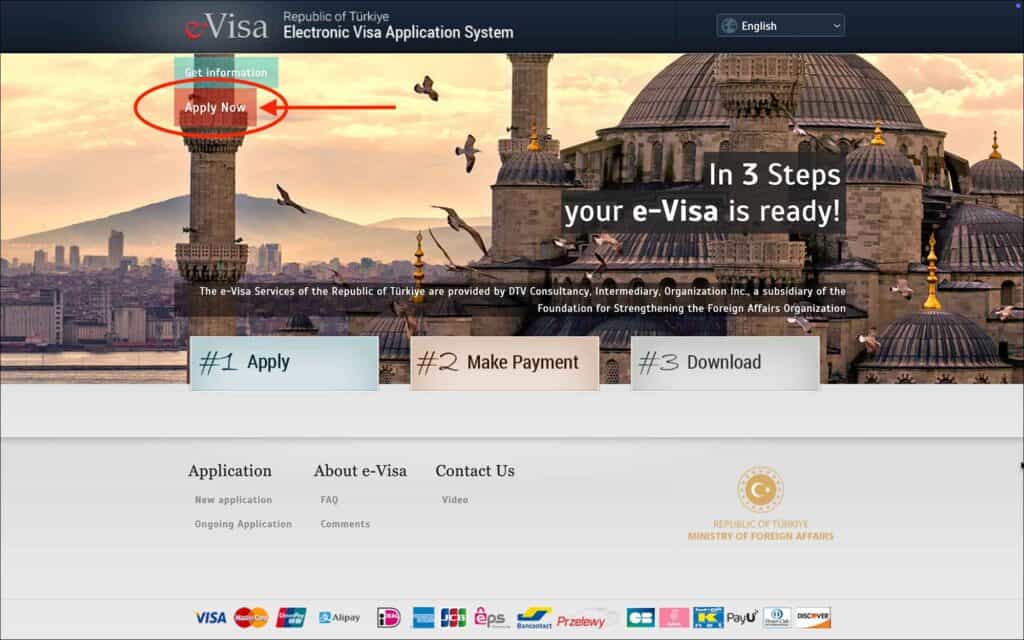
- Go to the Turkey e-Visa portal
- Click on the red “Apply Now” button
You will be taken to the “01. Country/Region” page.
01. Country/Region
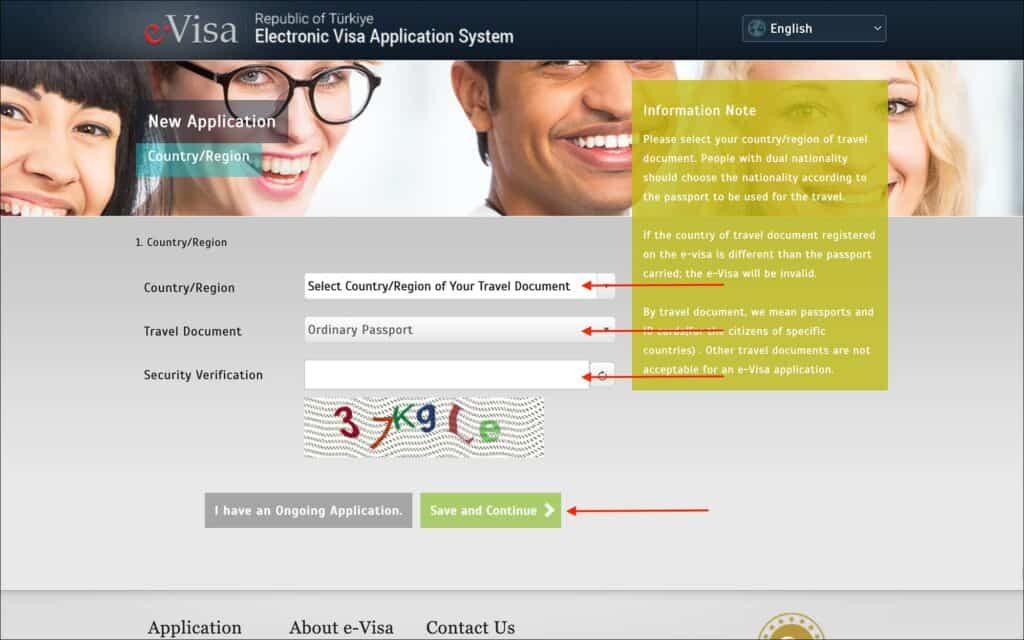
Enter the following information on this page.
- Country/Region [ Comment: Select your country of passport from the options]
- Travel Document [ Comment: Select “Ordinary Passport” from the options]
- Security Verification [ Comment: Enter the captcha shown on the screen]
Click on the green “Save and Continue >” button.
You will be taken to the “02. Date of Arrival” page.
02. Date of Arrival

- Arrival Date in Türkiye [ Comment: Select your expected date of arrival in Turkey from the calendar]
Depending on your arrival date entered above, your e-Visa validity dates (180 days) and allowed period of stay (30 days) are displayed on the page. Check these dates carefully before preceding to the next page.
You will be taken to the “03. Prerequisites” page.
03. Prerequisites

Select/agree to the following requirements on this page.
- My passport covers the period that I will be staying in Türkiye
- I can prove that I hold a return ticket, hotel reservation and at least $50 per each day of my stay
- I am traveling for the purposes of tourism or business
- I have a valid Supporting Document (Valid visa OR valid residence permit from one of the Schengen Countries, USA, UK or Ireland). E-visas are not accepted as supporting documents.
- I confirm that I meet each and every one of the conditions listed above
You will be taken to the “04. Personal Information” page.
04. Personal Information
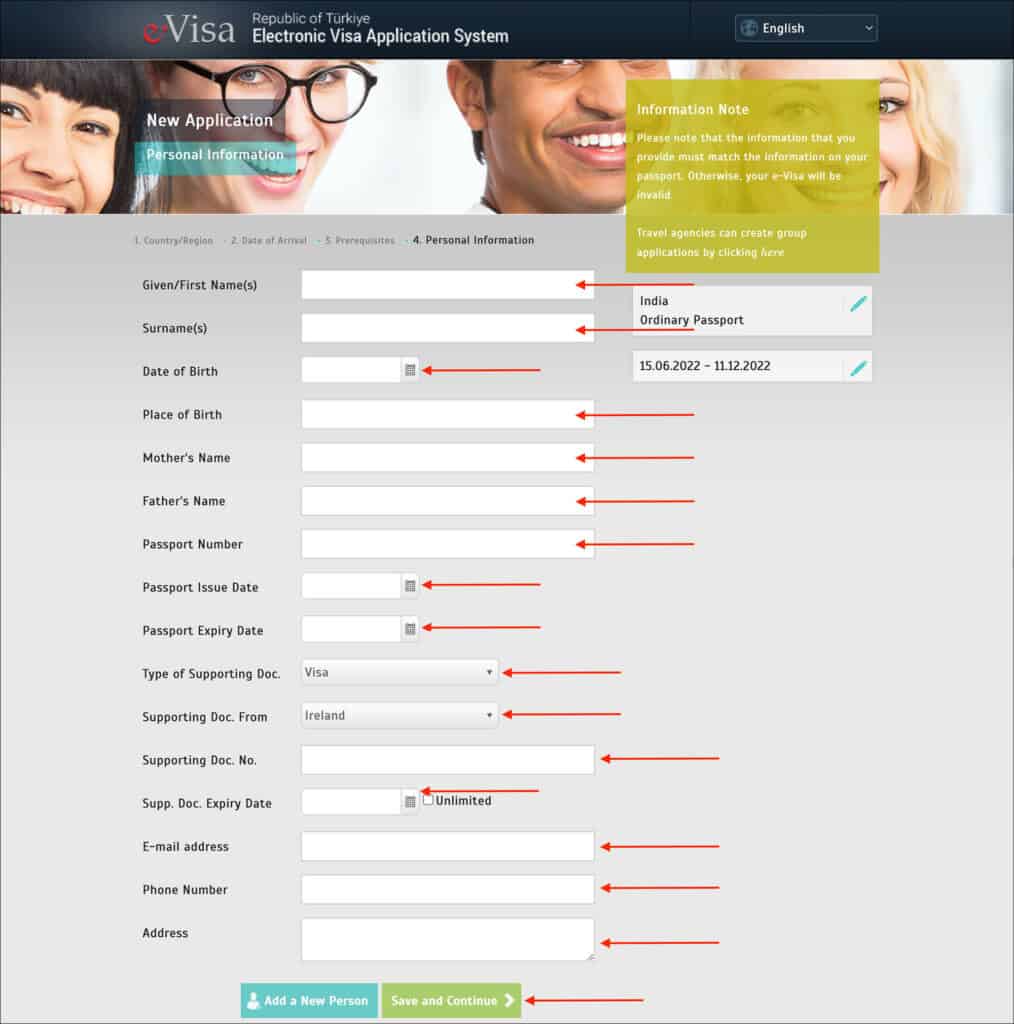
- Given/First Name(s) [ Comment: Enter your given name as it appears in your passport. If you have a middle name in your passport, combine your first and middle names and enter here]
- Surname(s) [ Comment: Enter your surname or last name as it appears in your passport]
- Date of Birth [ Comment: Enter your date of birth as it appears in your passport]
- Place of Birth [ Comment: Enter your place of birth as it appears in your passport]
- Mother’s Name [ Comment: Enter your mother’s name as it appears in your passport]
- Father’s Name [ Comment: Enter your father’s name as it appears in your passport]
- Passport Number [ Comment: Enter your passport number]
- Passport Issue Date [ Comment: Enter your passport issue date]
- Passport Expiry Date [ Comment: Enter your passport expiry date]
- Residence Permit
- United Kingdom
- Supporting Doc. No. [ Comment: Enter the number of your US, UK, Ireland or Schengen visa or residence permit]
- Supp. Doc. Expiry Date [ Comment: Enter the expiration date of your US, UK, Ireland or Schengen visa or residence permit]
- E-mail address [ Comment: Enter your email address where you would like to receive your Turkey e-Visa]
- Phone Number [ Comment: Enter your cell phone number from your country]
- Address [ Comment: Enter your residential address from your country]
If you are traveling as a family or in a group, click on the “Add a New Person” button to add your family or group members.
Family applications can be a maximum of 10. That means you can add up to 9 more family members to your application.
The requirement for family applications is that all applicants must be from the same country and their arrival dates must be the same. But it’s not necessary for all family members to travel together and/or on the same date.
After you enter your family member details, click on the green “Save and Continue >” button.
You will be shown a popup to verify your information.
Verify Your Information
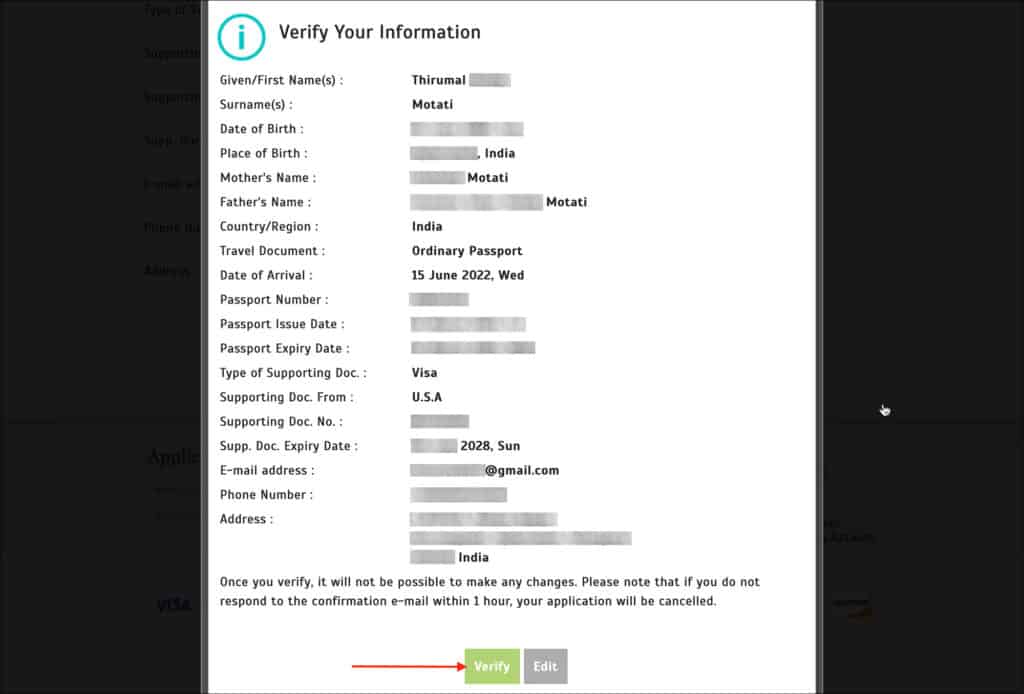
This popup will display all the information you have entered so far. You cannot change your information past this step, so go through all the information and make sure everything is correct and accurate.
If everything is looking good, click on the green “Verify” button.
The popup will close and you will be taken to the “application completed successfully” page.
Application Completed Successfully

Application complete message is displayed on this page along with instructions on the next steps.
This completes the first step of the application process. The next step is payment.
05. Email Verification
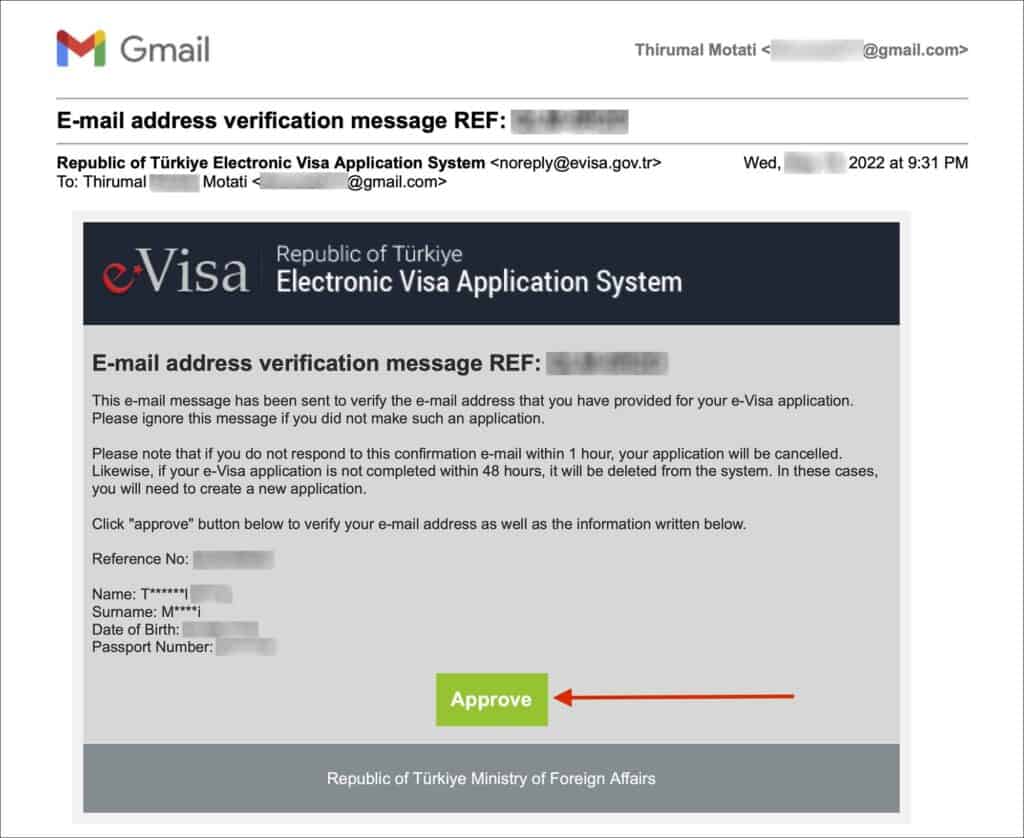
Go to your email inbox and look for an email from the Turkey e-Visa portal. Open the email and click on the green “Approve” button.
You will be taken back to the Turkey e-Visa portal’s “Payment” page.
06. Data Control
Even though “Data Control” is mentioned as a step on the Turkey e-Visa portal, this step is not displayed at all and you will be taken directly to the payment screen.
07. Payment

On this screen, the total visa fee to be paid is displayed. By default, the credit card option is displayed. You can use a credit card or a debit card to pay the visa fee.
- Card Number [ Comment: Enter your credit or debit card number]
- CVV/CVC/CVC2 [ Comment: Enter the CVV or CVC number of your card]
- Expiration Date [ Comment: Enter the expiration date of your card]
Click on the green “Make Payment >” button.
You will be taken to the “Turkey e-Visa download” page.
08. Download

Congratulations! Your Turkey e-Visa is approved and is ready to download.
On this page, you will see the message that your application is successfully completed and the instructions to download your approved Turkey e-Visa.
Click on the green “Download your e-Visa” button to download your Turkey e-Visa in PDF format.
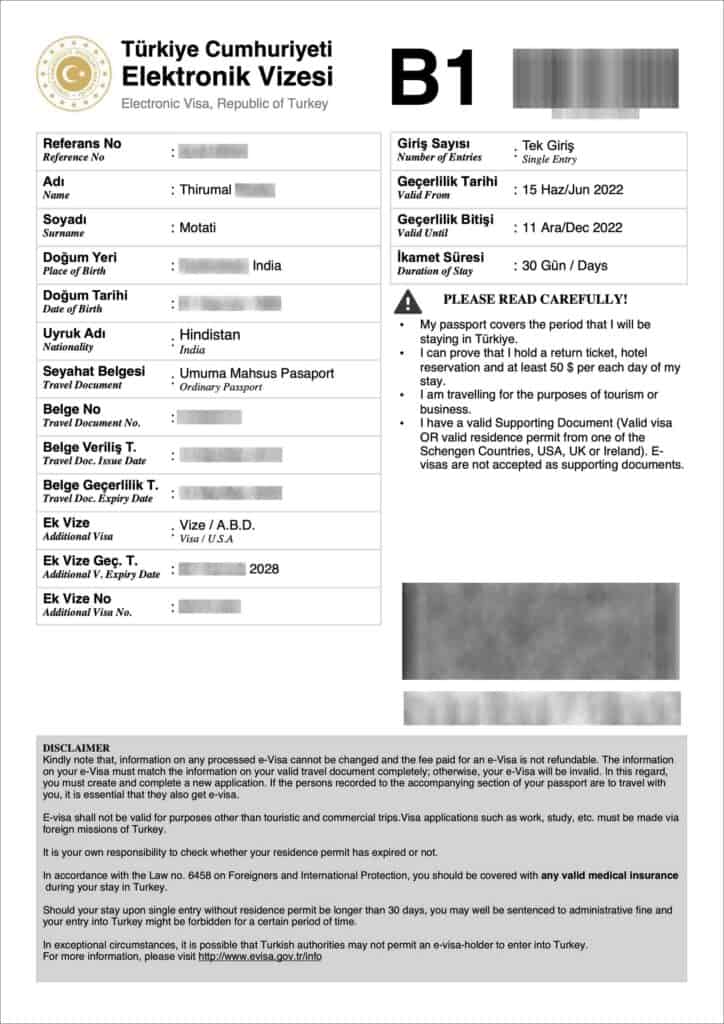
You will also receive an email notifying you that your e-Visa is approved and ready to download. You can also click on the green button “Download” in the email to download your e-Visa.
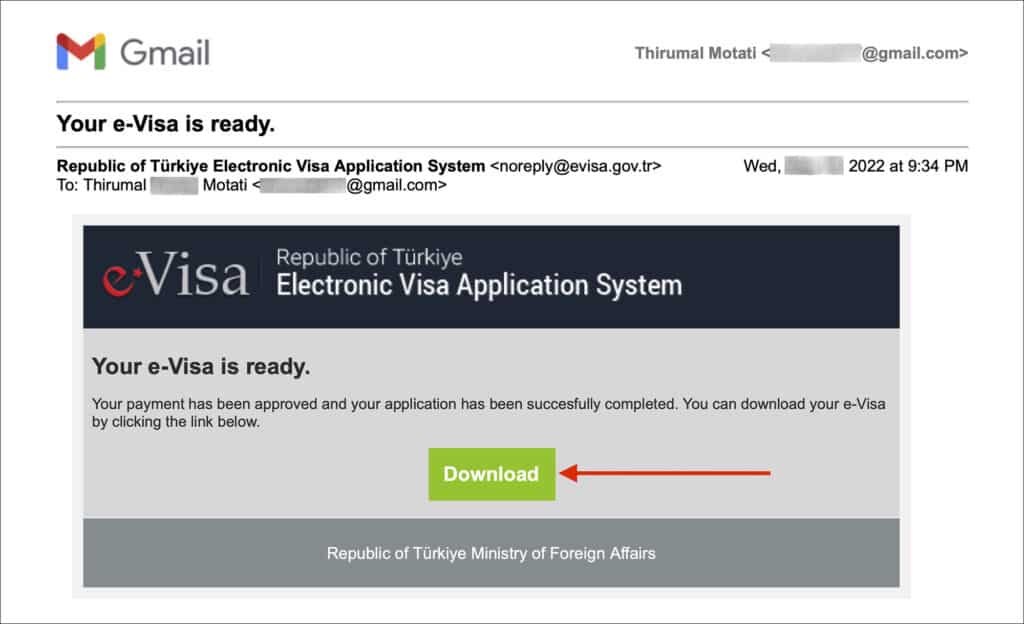
You can print your e-Visa or you can simply show it on your phone. Don’t forget to save a copy of the e-Visa PDF on your phone.
That’s it, folks! Make sure to carry a print of your Turkey e-Visa or a copy of it on your phone when you travel.
If you are having any troubles with your Turkey e-Visa application, comment below. I will try my best to help.
WRITTEN BY THIRUMAL MOTATI

Thirumal Motati is an expert in tourist visa matters. He has been traveling the world on tourist visas for more than a decade. With his expertise, he has obtained several tourist visas, including the most strenuous ones such as the US, UK, Canada, and Schengen, some of which were granted multiple times. He has also set foot inside US consulates on numerous occasions. Mr. Motati has uncovered the secrets to successful visa applications. His guidance has enabled countless individuals to obtain their visas and fulfill their travel dreams. His statements have been mentioned in publications like Yahoo, BBC, The Hindu, and Travel Zoo.
PLAN YOUR TRAVEL WITH VISA TRAVELER
I highly recommend using these websites to plan your trip. I use these websites myself to apply for my visas, book my flights and hotels and purchase my travel insurance.
01. Apply for your visa
Get a verifiable flight itinerary for your visa application from DummyTicket247 . DummyTicket247 is a flight search engine to search and book flight itineraries for visas instantly. These flight itineraries are guaranteed to be valid for 2 weeks and work for all visa applications.
02. Book your fight
Find the cheapest flight tickets using Skyscanner . Skyscanner includes all budget airlines and you are guaranteed to find the cheapest flight to your destination.
03. Book your hotel
Book your hotel from Booking.com . Booking.com has pretty much every hotel, hostel and guesthouse from every destination.
04. Get your onward ticket
If traveling on a one-way ticket, use BestOnwardTicket to get proof of onward ticket for just $12, valid for 48 hours.
05. Purchase your insurance
Purchase travel medical insurance for your trip from SafetyWing . Insurance from SafetyWing covers COVID-19 and also comes with a visa letter which you can use for your visas.
Need more? Check out my travel resources page for the best websites to plan your trip.
LEGAL DISCLAIMER We are not affiliated with immigration, embassies or governments of any country. The content in this article is for educational and general informational purposes only, and shall not be understood or construed as, visa, immigration or legal advice. Your use of information provided in this article is solely at your own risk and you expressly agree not to rely upon any information contained in this article as a substitute for professional visa or immigration advice. Under no circumstance shall be held liable or responsible for any errors or omissions in this article or for any damage you may suffer in respect to any actions taken or not taken based on any or all of the information in this article. Please refer to our full disclaimer for further information.
AFFILIATE DISCLOSURE This post may contain affiliate links, which means we may receive a commission, at no extra cost to you, if you make a purchase through a link. Please refer to our full disclosure for further information.
RELATED POSTS
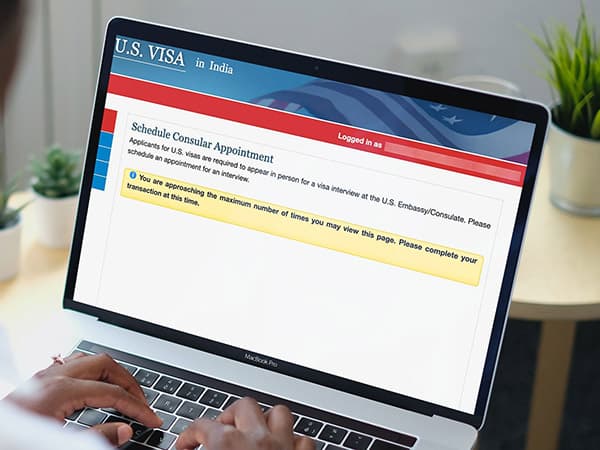
Loading 8 Comments... Please Wait.
- Cookie Policy
- Copyright Notice
- Privacy Policy
- Terms of Use
- Flight Itinerary
- Hotel Reservation
- Travel Insurance
- Onward Ticket
- Testimonials
Search this site
Do you need a visa to go to Turkey?

Sep 25, 2021 • 2 min read

Escape to Turkey's dreamy coastline © sueleymancoskun / Shutterstock
With its wealth of historic sites and diverse, stunning landscapes, Turkey is a perennially popular destination for travelers, and passport-holders from more than 100 countries can easily enjoy all that it has to offer.
Here’s our guide to Turkey’s entry requirements, with information on visa types and rules around exemptions and extensions.
What you need to know about tourist visas in Turkey
Visitors from Europe (excluding Cyprus), Israel, Japan, New Zealand and much of South America and Central America can enter Turkey without a visa for stays ranging between 30 and 90 days, depending on their country of citizenship.
Tourists from more than 100 additional countries, including Australia, Canada and the USA, are eligible to apply for an e-visa. This requires simply filling out an online application form and paying a fee, which varies by country of origin but generally ranges between $20 and $60.
Travelers who need to apply for an e-visa can do so through a dedicated website run by the Turkish Ministry of Foreign Affairs (MFA), which includes a detailed FAQ section. Alternatively, visas on arrival are available to citizens of around 30 countries , but, generally, completing the visa application online before traveling is the quicker and easier option.
The Turkish Ministry of Foreign Affairs website provides details on visa requirements for all individual countries. All travelers’ passports should be valid for at least 60 days beyond the duration of the visa for which they are eligible.
Tourist visas for cruise ship passengers
Cruise ship passengers who arrive by sea can come ashore for up to 72 hours (three days) without applying for a visa.
Visa extensions and other types of visas
Visa extensions are not available to nationals of any country. Anyone who wishes to stay in Turkey longer than the duration allowed by their tourist visa (90 days within a 180-day period for US citizens, Europeans and some others) must start the process of applying for a residence permit before their visa expires. Overstaying a tourist visa can incur a fine and might even result in a temporary ban on returning to Turkey.
Anyone who plans to work, study or live in Turkey must apply for the appropriate visa at a Turkish embassy or consulate abroad before entering the country.
You might also like: The most incredible ancient sites in Turkey How to drink Turkish coffee like a local Turkey by train: a guide to travelling on the Dogu Express
Explore related stories

Sustainable Travel
May 9, 2024 • 5 min read
In 2023 two earthquakes rocked southeastern Turkey, killing thousands of people and displacing millions. Here's the latest on tourism in the region.

Mar 22, 2024 • 4 min read

Mar 14, 2024 • 6 min read

Mar 13, 2024 • 6 min read

Mar 11, 2024 • 4 min read

Mar 10, 2024 • 6 min read

Mar 3, 2024 • 4 min read

Jan 31, 2024 • 6 min read

Dec 14, 2023 • 6 min read

Oct 25, 2023 • 7 min read
The Ultimate Guide to Obtaining a Turkish e-Visa
- 9 June 2023

For many international travelers, Turkey offers an electronic visa that can be applied for and obtained online. The Turkish e-Visa can be obtained by following a straightforward process, allowing eligible travelers to stay between 30 and 90 days within 180 days. It is a convenient means of acquiring a visa to Turkey for tourism or business purposes. Not every nationality can travel to Turkey with an e-visa, so it’s important to check whether your country is eligible before applying online.
This article will explain the Turkish e-Visa and the basic requirements to apply for one. It will also give a step-by-step overview of the application process and answer commonly asked questions for potential applicants.
What is a Turkish e-Visa?
The Turkish e-visa is an electronic travel authorization that foreign travelers can obtain online to enter Turkey for short-term stays. An e-Visa can be acquired by travelers coming to Turkey for tourism or business. The e-Visa is a convenient alternative to the traditional, paper-based visa process that allows travelers to complete the visa application process anywhere with an internet connection. Instead of going through a Turkish consulate or embassy, a process that often requires attending appointments and mailing documents, travelers can simply fill out the application online and pay the visa fee online.
Requirements for a Turkish e-Visa
Obtaining a Turkish e-Visa can be done easily and does not require many steps. However, applicants must meet all the requirements for an e-Visa before applying.
Basic requirements for applying for a Turkish e-Visa include:
- A passport or travel identity document from a country eligible for a Turkish e-Visa will remain valid at least 60 days beyond the duration of stay of their Turkish e-Visa. For a 90-day e-Visa, the document must be valid for at least 150 days (90 days of stay + 60 days after).
- An email address where the Turkish authorities can contact the applicant.
- A valid debit or credit card to pay the e-Visa fee online.
Additional requirements for the Turkey e-Visa include:
These requirements vary depending on the applicant’s nationality and are additional requirements on top of the basic ones.
- Possessing a valid supporting document (i.e. a valid visa or valid residence permit from a Schengen Zone country, the United States, United Kingdom, or Ireland).
- Proving that the intended stay in Turkey is short-term and only for a valid reason (as listed above). This could include tourism or attending a business conference. It does not include living, working, or studying in Turkey for extended periods of time.
- Sufficient funds to cover the entire stay in Turkey. Travelers will typically require a daily amount of $50 per day.
- An airline ticket booked through a Turkey Ministry of Foreign Affairs approved airline.
- A valid hotel reservation or other proof of accommodation.
These eligibility requirements may change depending on the applicant’s unique situation, nationality, and planned trip to Turkey.

Application Process for a Turkish e-Visa
Applying for a Turkish e-Visa can be done through a straightforward process. Some steps in the visa application process for a Turkish e-Visa may be subject to change based on the applicant’s nationality and reason for visiting Turkey. However, most applicants will take the following steps to obtain their Turkish e-Visa:
Step 1: Determine eligibility for a Turkish e-Visa
Not all nationalities can apply for a Turkish e-Visa, so it’s essential for the applicants to start by checking their eligibility for the e-Visa.
Step 2: Gather and organize the required documents
Several documents are required by the Turkish authorities to process an e-Visa application. While this list will change depending on the purpose of traveling and the applicant’s nationality, the following documents are typically required of all applicants:
- A valid passport or travel document that is valid for at least 60 days beyond the duration of stay of the Turkey e-Visa.
- A valid email address for the visa to be sent to once approved
- A valid debit or credit card that can be used to pay the e-Visa fee
Step 3: Submit the e-Visa application online
After determining their eligibility and gathering all required documents, applicants can submit their e-Visa online. Most applicants will follow these steps:
- Complete the Turkey e-Visa application form.
- Fill in your nationality and planned arrival date to Turkey.
- Read the country-specific information provided, including the validity of the e-Visa, whether the e-Visa will be single or multiple-entry, and the length of the permitted stay.
- Continue to the additional steps if your passport is from a country that requires further documentation.
- Complete the required personal and contact information, as well as details concerning your travel document.
- Double-check all information in the application and edit them if necessary.
- Pay the e-Visa fee with a valid credit or debit card.
Step 4: Receive the Turkish e-Visa
Once the application is submitted and the fee is paid, an initial confirmation email will be sent. If the e-Visa is approved, another email will be sent after processing with the e-Visa attached as a PDF. This can be printed and presented to the Turkish immigration officers upon arrival.
The processing times for Turkish e-Visas can vary depending on the purpose of travel and the applicant’s nationality, so it’s advised to apply for the visa 48 hours before travel.
FAQs About Turkish e-Visas
The processing times for Turkish e-Visas can vary but typically processed within 24-48 hours. Processing times will be longer during peak travel times and if the applicant’s situation is more complex.
A Turkish e-Visa can vary depending on your nationality.
If your application for a Turkish e-Visa is rejected, you will receive an email explaining why. In most cases, the rejection is due to incorrect or incomplete information provided in the application. You can submit a new application with the correct information in this case. Suppose your application is rejected for other reasons, such as a criminal record or issues with your passport. In that case, you may need to apply for a traditional visa through a Turkish consulate or embassy.
You cannot apply for a Turkish e-Visa if you are already in Turkey. The e-Visa must be obtained before traveling to Turkey.
Can I use a Turkish e-Visa to enter Turkey by land or sea?
For those who come from eligible countries, obtaining a Turkish e-Visa is a quick and easy way to apply for and obtain access to Turkey for short-term tourism, business, or medical treatment visits. Depending on your nationality and the reason for your trip, the cost and processing time for an e-Visa may change. To guarantee that you obtain your e-Visa in time for your trip, you should submit your application 48 hours beforehand. Your trip plans may be affected if you are denied entry to Turkey due to a lack of a valid visa. Therefore, all applicants must confirm their eligibility, compile the required documentation, and double-check their e-Visa application before submitting it online. Once they receive their e-Visa, they can enjoy all the splendid sites and experiences Turkey has to offer!
Update May 10, 2024
Information for u.s. citizens in the middle east.
- Travel Advisories |
- Contact Us |
- MyTravelGov |
Find U.S. Embassies & Consulates
Travel.state.gov, congressional liaison, special issuance agency, u.s. passports, international travel, intercountry adoption, international parental child abduction, records and authentications, popular links, travel advisories, mytravelgov, stay connected, legal resources, legal information, info for u.s. law enforcement, replace or certify documents.
Before You Go
Learn About Your Destination
While Abroad
Emergencies
Share this page:
Travel Advisory July 26, 2023
Turkey - level 2: exercise increased caution.
Reissued with obsolete COVID-19 page links removed.
Exercise increased caution when traveling to Turkey due to terrorism and arbitrary detentions. Some areas have increased risk. Read the entire Travel Advisory.
Do Not Travel To:
- Sirnak province, Hakkari province, and any area within six miles (10 kilometers) of the Syrian border due to terrorism.
Country Summary: Terrorist groups continue plotting possible attacks in Turkey. Terrorists may attack with little or no warning, targeting tourist locations, transportation hubs, markets/shopping malls, local government facilities, hotels, clubs, restaurants, places of worship, parks, major sporting and cultural events, educational institutions, airports, and other public areas.
Security forces have detained tens of thousands of individuals, including U.S. citizens, for alleged affiliations with terrorist organizations based on scant or secret evidence and grounds that appear to be politically motivated. U.S. citizens have also been subject to travel bans that prevent them from departing Turkey. Participation in demonstrations not explicitly approved by the Government of Turkey, as well as criticism of the government (including on social media), can result in arrest.
Read the country information page for additional information on travel to Turkey.
If you decide to travel to Turkey:
- Stay alert in locations frequented by tourists.
- Avoid demonstrations and crowds.
- Stay at hotels with identifiable security measures.
- Monitor local media and be prepared to adjust your plans quickly.
- Enroll in the Smart Traveler Enrollment Program ( STEP ) to receive travel alerts and make it easier to locate you in an emergency.
- Follow the Department of State on Facebook and Twitter .
- Review the Country Security Report for Turkey.
- Visit the CDC page for the latest Travel Health Information related to your travel.
- Prepare a contingency plan for emergency situations. Review the Traveler’s Checklist .
Sirnak Province, Hakkari Province, and Any Area within six miles (ten kilometers) of the Syrian Border – Level 4: Do Not Travel
Do not travel to Sirnak province, Hakkari province, or any area within six miles (10 kilometers) of the Turkey/Syria border due to the continued threat of attacks by terrorist groups, armed conflict, and civil unrest. Terrorist attacks, including suicide bombings, ambushes, car bomb detonations, and improvised explosive devices, as well as shootings, and illegal roadblocks leading to violence have occurred in these areas. U.S. government employees are subject to travel restrictions in the entire provinces of Sirnak and Hakkari, and any areas within 10 km of the Syrian border.
Visit our website for Travel to High-Risk Areas .
Embassy Messages
View Alerts and Messages Archive
Quick Facts
Six months beyond date of entry
One page for entry and exit stamps
Not required for stays under 90 days
25,000 Turkish lira or 10,000 euros (or equivalent)

Embassies and Consulates
U.s. embassy ankara.
1480 Sok No:1 Cukurambar Mah Cankaya 06530, Ankara Turkey Telephone: +(90) (312) 294-0000 (emergencies only) Fax: +(90) (312) 232-7472 Contact American Citizen Services Ankara
U.S. Consulate General Istanbul Istinye Mahallesi, Üç Şehitler Sokak No.2 Istinye 34460 – Istanbul, Turkey Telephone: +(90) (212) 335-9000 Emergency After-Hours Telephone: +(90) (212) 335-9000 Fax: +(90) (212) 335-9102 Contact American Citizen Services Istanbul
U.S. Consulate Adana Girne Bulvari No. 212, Güzelevler Mahallesi, Yüregir Adana, Turkey Telephone: +(90) (322) 455-4100 Emergency After-Hours Telephone: +(90) (322) 455-4100 Fax: +(90)(322) 455-4141 Contact American Citizen Services Adana
U.S. Consular Agent - Izmir Emergency After-Hours Telephone: +(90) (312) 455-5555 [email protected]
Destination Description
Learn about the U.S. relationship to countries around the world.
Entry, Exit and Visa Requirements
Visit the Embassy of the Republic of Turkey website for the most current visa and residency permit information.
- In Turkey, contact the nearest Directorate General of Migration Management office to obtain a residence permit.
Obey all Turkish visa regulations and maintain valid residence permits at all times. The U.S. Embassy is unable to assist with Turkish immigration or visa-related matters. Turkish authorities enforce immigration laws.
- Passports must be valid for six months beyond your entry date. You will be denied entry into Turkey if there is not enough space for entry and exit stamps in your passport.
- Official passport holders are required to have visa to enter Türkiye .
- Ordinary passport holders are exempted from visa up to 90 days in any 180-day period.
- Get entry and exit stamps . You must have a Turkish entry stamp to fly domestically. Get an exit stamp in your passport when leaving the country or you may face difficulties re-entering Turkey in the future and a fine .
- If you are planning to work, study, or conduct academic or scientific research in Turkey, you must receive a visa from a Turkish embassy or consulate before arriving in Turkey. Visit “Living in Turkey” on the U.S. Embassy’s website.
Syria: See the Syria travel advisory. The U.S. Embassy in Damascus suspended operations in February 2012. The Department of State continues to warn U.S. citizens against all travel to Syria. At this time, the Turkey-Syria border is closed except in cases of urgent medical treatment or safety from immediate danger as defined by the Government of Turkey.
Iraq: See the Iraq travel advisory . The Department of State continues to warn U.S. citizens against all travel to Iraq. The Turkish Government tightly controls entry and exit on the border.
HIV/AIDS restrictions: The U.S. Department of State is unaware of any HIV/AIDS entry restrictions for visitors to or foreign residents of Turkey.
Find information on dual nationality , prevention of international child abduction and customs regulations on our websites.
Safety and Security
Terrorism: The potential for terrorist attacks in Turkey, including against U.S. citizens and interests, remains high.
- Terrorists have previously attacked U.S. interests in Turkey, including the U.S. Embassy in Ankara, the U.S. Consulate General in Istanbul, and the U.S. Consulate in Adana.
- Terrorist groups continue plotting possible attacks in Turkey. Terrorists may attack with little or no warning, targeting tourist locations, transportation hubs, markets/shopping malls, local government facilities, hotels, clubs, restaurants, places of worship, parks, major sporting and cultural events, educational institutions, airports, and other public areas. Terrorists have also previously targeted Western tourists and expatriates.
Under laws passed in 2018, Turkish security forces have an expanded legal ability to stop and search individuals and to detain individuals without charge.
For your own safety:
- Carry a passport or identity document at all times.
- Follow local news sources during your stay to remain abreast of any potential areas, dates, or times of concern.
- Exercise caution and good judgment, keep a low profile, and maintain a high level of vigilance.
- Avoid demonstrations, which may become violent and unpredictable.
- Obey the instructions of Turkish security personnel at all times.
There have also been threats and acts of violence targeting religious minorities, groups, institutions, and places of worship in Turkey. The level of anti-Israeli and anti-Semitic sentiment remains significant.
Protests and gatherings: Public gatherings are common in Turkey and can include protests or demonstrations, holiday celebrations, family events, sporting events, and political events in the lead up to elections and following the announcement of election results. U.S. citizens should
- Avoid demonstrations and gatherings, as they may become violent and unpredictable.
- Be aware celebratory gunfire is common in some areas and has resulted in deaths in recent years.
- Follow local authorities instructions, police may take action to disperse the group, including possibly using teargas or detaining participants, even when the government has approved gatherings.
Crime: Overall street crime in Turkey is low; however, you should use the same precautions you would take in the United States. The following types of crime have been reported in Turkey:
- Pick-pocketing , purse snatching , and mugging. Carry only necessary items when in tourist areas.
- Residential crime occurs more often in major cities, with criminals targeting ground floor apartments for theft.
- Sexual assault has occurred in Turkish baths ( hamams ) or spas, in taxis, and when traveling alone at night. Assaults involving date rape drugs have also been reported.
- Confidence schemes occur where travelers are tricked into ordering food or drinks at a restaurant, and then are charged incredibly high prices. Patronize well-established restaurants and ask to see a menu with prices before ordering anything.
- Scams are common in Turkey, particularly internet scams involving people who met online. Typically, the person in Turkey asks the other person to wire large sums of money to provide financial assistance. Do not send money to someone you have never met in person. Exercise due diligence when purchasing jewelry, rugs, or real estate. See the Department of State and the FBI pages for information on scams.
Eastern and Southeastern Turkey: We strongly recommend that U.S. citizens reconsider travel to specific areas in eastern and southeastern Turkey, and do not travel to areas near the Syrian or Iraqi borders.
U.S. Government employees are subject to travel restrictions to the provinces of Batman, Bingol, Bitlis, Diyarbakir, Gaziantep, Hakkari, Hatay, Kilis, Mardin, Sanliurfa, Siirt, Sirnak, Tunceli and Van. Mount Ararat , in Agri province, is a special military zone, and access permission must be obtained before coming to Turkey from a Turkish Embassy or Consulate.
The following incidents and activities have taken place in eastern and southeastern Turkey :
- Terrorist attacks: Terrorist groups, including Da’esh, also referred to as The Islamic State of Iraq and the Levant (ISIL) or The Islamic State of Iraq and ash Sham (ISIS), and the PKK (the Kurdistan Workers’ Party), have conducted large-scale attacks in the area, including suicide bombings, ambushes, and the detonation of car bombs, improvised explosive devices, and other homemade weapons. The PKK has attacked Turkish military and police personnel in the eastern and southeastern provinces, occasionally harming bystanders.
- Restricted access: Turkish security forces control access to the southeastern provinces of Hakkari, Mardin and Sirnak along the Iraqi border, and the entire Turkey-Syria border. Do not photograph or video Turkish military operations or attempt to enter military installations anywhere in Turkey.
- Shootings: Turkish towns located along the border with Syria have been struck by bullets and artillery rounds that originate in Syria, some resulting in deaths or injuries.
- Roadblocks: Use commercial air travel whenever possible while traveling to southeastern Turkey. If road travel is necessary, drive only during daylight hours and on major highways. The Turkish Jandarma (rural police) monitors checkpoints on roads. Cooperate if stopped at a checkpoint. Be prepared to provide identification and vehicle registration. Remain calm, do not make any sudden movements, and obey all instructions. We strongly discourage the use of public transportation in the southeastern region.
- Demonstrations: Violent clashes have taken place between Kurdish groups and Turkish police resulting from organized demonstrations.
- Curfews: The Turkish Government has instituted temporary curfews in cities throughout the southeast due to blockades of certain neighborhoods by the PKK. Adhere to any locally imposed curfews.
Victims of Crime: Report crimes to the local police by dialing 155 and contact the U.S. Embassy or nearest consulate. Remember that local authorities are responsible for investigating and prosecuting the crime. See our webpage on help for U.S. victims of crime overseas . We urge U.S. citizen victims of sexual assault to contact the U.S. Embassy or closest consulate.
We can:
- help you find appropriate medical care
- assist you in reporting a crime to the police
- contact relatives or friends with your written consent
- Provide general information regarding the victim’s role during the local investigation and following its conclusion.
- provide a list of local attorneys
- provide our information on victim’s compensation programs in the U.S.
- provide an emergency loan for repatriation to the United States and/or limited medical support in cases of destitution
- help you find resources for accommodation and flights home
- replace a stolen or lost passport
Domestic Violence: U.S. citizen victims of domestic violence may contact the Embassy for assistance and visit the Embassy webpage for resources.
Tourism: The tourism industry is generally regulated and rules with regard to best practices and safety inspections are regularly enforced. Hazardous areas/activities are identified with appropriate signage and professional staff is typically on hand in support of organized activities. In the event of an injury, appropriate medical treatment is widely available throughout the country. Outside of a major metropolitan center, it may take more time for first responders and medical professionals to stabilize a patient and provide life-saving assistance. U.S. citizens are encouraged to purchase medical evacuation insurance .
Local Laws & Special Circumstances
Criminal Penalties: You are subject to local laws. If you violate local laws, even unknowingly, you may be expelled, arrested, or imprisoned.
- Always carry with you a form of official government photo identification, such as a residence permit or copy of your passport.
Furthermore, some laws are also prosecutable in the U.S., regardless of local law. For examples, see our website on crimes against minors abroad and the Department of Justice website.
Arrest Notification: If you are arrested or detained, ask police or prison officials to notify the U.S. Embassy immediately. Turkish authorities may not inform U.S. officials of dual nationals arrested in Turkey. See our webpage for further information on arrests.
- Insulting the State: It is illegal to show disrespect to the name or image of Mustafa Kemal Atatürk, or to insult the Turkish Government, flag, President, or security forces, including on social media . Erase any sensitive photos, comments, or other materials from your social media pages, cameras, laptops, and other electronic devices that could be considered controversial or provocative.
- Drug offenses: Turkish law enforcement is very aggressive in combating illegal drugs. Penalties for possession, use, or trafficking of illegal drugs are very strict, and include heavy fines and jail sentences between four and 20 years.
- Cultural artifacts: Turkish law has a broad definition of “antiquities” and makes it a crime to remove any from the country. If you buy antiquities, use authorized dealers and get museum certificates for each item. Failure to have a receipt and certificate at departure can result in your arrest , and jail time . Contact the Embassy of the Republic of Turkey in Washington for specific information regarding customs requirements.
- Male dual nationals over the age of 18 may be subject to Turkish conscription and compulsory military service. Consult officials at Turkish Embassies or Consulates with any questions before entering Turkey.
- Counterfeit goods: Do not buy counterfeit or pirated goods, even if widely available. They are both illegal to bring back into the United States and to purchase locally.
- Religious proselytizing: There is no law against religious proselytizing.
Faith-Based Travelers: See our following webpages for details:
- Faith-Based Travel Information
- International Religious Freedom Report – see country reports
- Human Rights Report – see country reports
- Hajj Fact Sheet for Travelers
- Best Practices for Volunteering Abroad
LGBTI Travelers: Homophobia, transphobia, and intolerance towards homosexuality are widespread throughout Turkey. Lesbian, gay, bisexual, transgender, and intersex (LGBTI) individuals are not protected by anti-discrimination laws and have been the targets of violence in recent years. References in the law relating to “offenses against public morality,” “protection of the family,” and “unnatural sexual behavior,” are sometimes used as a basis for abuse by law enforcement officials. In addition, the law states that “no association may be founded for purposes against law and morality,” a clause which has been used by authorities in attempts to shut down or limit the activities of associations working on LGBTI matters.
See our LGBTI Travel Information page and section 6 of our Human Rights report for further details.
Travelers Who Require Accessibility Assistance: The Turkish constitution prohibits discrimination against persons with disabilities in the provision of state services, employment, education and access to health care. However, access to buildings and public transportation for the disabled in most cities is quite limited, and generally, accessibility for people with disabilities in Turkey is poor. Airports and metro stations are typically accessible, but other forms of public transport (buses) are not.
Students: See our Students Abroad page and FBI travel tips .
Women Travelers: The Embassy is aware of multiple sexual assaults against U.S. citizens in Turkey, including assaults against tourists traveling alone or in small groups, and at spas and hamams.
- If you are sexually assaulted, please seek immediate help from the Turkish National Police, Turkish Health Services, or nearest hospital if you feel safe doing so.
- We urge you to contact the closest U.S. Embassy or Consulate for assistance.
See our travel tips for Women Travelers .
Earthquakes: Earthquakes occur throughout Turkey. Make contingency plans and leave emergency contact information with family members outside Turkey. General information about natural disaster preparedness is available from the U.S. Federal Emergency Management Agency (FEMA) and at Ready.gov. For more information on disaster preparedness, please click on the following links:
- U.S. Geological Survey (USGS)
- FEMA: Earthquakes
- FEMA for Kids: Emergency Preparedness
- U.S. Centers for Disease Control and Prevention (CDC) Earthquake Preparedness
Medical care provided in Turkish hospitals varies greatly. Though new private hospitals in Ankara, Antalya, Izmir and Istanbul have modern facilities, equipment, numerous U.S.-trained specialists, and international accreditation, some still may be unable to treat certain serious conditions. Health care standards are lower in small cities in Turkey.
We do not pay medical bills. Be aware that U.S. Medicare does not apply overseas.
Medical Insurance: Make sure your health insurance plan provides coverage overseas. Most care providers overseas only accept cash payments. See our webpage for more information on insurance overseas.
We strongly recommend supplemental insurance to cover medical evacuation.
If traveling with prescription medication, check with the government of Turkey to ensure the medication is legal in Turkey. Always carry your prescription medication in original packaging with your doctor’s prescription. Some medications may be unavailable in Turkey.
For U.S. citizens who live in Turkey , please see the Embassy’s website for information on the Turkish General Health Insurance (GHI) law . If you are considering enrolling in Turkish GHI, carefully research what is and is not covered. Once you enroll in GHI, your coverage can only be cancelled if your residence permit expires or if you no longer reside in Turkey.
Vaccinations: Be up-to-date on all vaccinations recommended by the U.S. Centers for Disease Control and Prevention.
Further health information:
- World Health Organization
- U.S. Centers for Disease Control and Prevention (CDC)
Travel and Transportation
Road Conditions and Safety: Roads in Turkey range from single-lane country roads to modern, divided motorways. Highways in the tourist-frequented western, southwestern, and coastal regions of Turkey are generally in good condition and are well maintained, while conditions in other areas vary.
Be extremely cautious while driving at night. Driving after dark, especially in rural areas, requires extra caution due to dangers such as livestock on the road or narrow unmarked or unpaved roads.
In case of an accident or car trouble :
- Pull to the side of the road, turn on hazard lights, and use reflector triangles.
- For accidents with only vehicular damage, exchange insurance information, take photos of the accident before moving the vehicles, and depart if both sides agree. Turkish law requires drivers to fill out a Turkish-only form and provide pictures of the damage. Non-Turkish speakers should call and wait for the police.
- For accidents with injury or a disagreement, remain at the site of the accident. Do not move the vehicle – even out of the way – until the Traffic Police arrive. Report the accident to the Traffic Police (dial 155) or Jandarma (dial 156). Get a certified copy of the official report from the Traffic Police office (this can take several days).
- The owner of the damaged vehicle should also apply to the customs authority with his passport and accident report before attempting to repair the vehicle or leave the country without the vehicle.
- When in doubt, it is best to call the Traffic Police or the Jandarma in the event of an accident.
Traffic Laws: Drive defensively at all times. Drivers routinely ignore traffic regulations, including driving through red lights and stop signs, and turning left from the far right lane. These and other similar driving practices cause frequent traffic accidents.
- Penalties for driving drunk (blood alcohol levels at or above 0.05 percent) include a fine and the individual’s license being confiscated for six months .
- Using cell phones while driving is illegal and can lead to a fine .
Driver’s license requirements include:
- For stays up to 180 days : A valid U.S. driver’s license or an International Driving Permit and a U.S. driver’s license is acceptable.
- For stays longer than 180 days : Obtain a Turkish driver’s license from the Turkish Security Directorate, Traffic Department (Emniyet Müdürlüğü, Trafik Hizmetleri Başkanlığı).
- A vehicle can be brought into Turkey for up to six months. Find information at the Turkish Touring and Automobile Club.
Public Transportation: Major cities in Turkey have extensive public transportation options including taxis, subways, ferries, trains, buses and mini-buses. Licensed cabs are metered. Between cities, Turkey has bus routes, train, and air services.
See our Road Safety page for more information.
Aviation Safety Oversight: The U.S. Federal Aviation Administration (FAA) has assessed the government of Turkey’s Civil Aviation Authority as being in compliance with International Civil Aviation Organization (ICAO) aviation safety standards for oversight of Turkey’s air carrier operations. Further information may be found on the FAA’s safety assessment page .
Maritime Travel: Mariners planning travel to Turkey should also check U.S. maritime advisories and alerts . Information may also be posted to the U.S. Coast Guard homeport website , and the NGA broadcast warnings website - select “broadcast warnings”.
For additional travel information
- Enroll in the Smart Traveler Enrollment Program (STEP) to receive security messages and make it easier to locate you in an emergency.
- Call us in Washington, D.C. at 1-888-407-4747 (toll-free in the United States and Canada) or 1-202-501-4444 (from all other countries) from 8:00 a.m. to 8:00 p.m., Eastern Standard Time, Monday through Friday (except U.S. federal holidays).
- See the State Department’s travel website for the Worldwide Caution and Travel Advisories .
- Follow us on Twitter and Facebook .
- See traveling safely abroad for useful travel tips.
Review information about International Parental Child Abduction in Turkey . For additional IPCA-related information, please see the International Child Abduction Prevention and Return Act ( ICAPRA ) report.
Travel Advisory Levels
Assistance for u.s. citizens, learn about your destination, enroll in step.

Subscribe to get up-to-date safety and security information and help us reach you in an emergency abroad.
Recommended Web Browsers: Microsoft Edge or Google Chrome.
Check passport expiration dates carefully for all travelers! Children’s passports are issued for 5 years, adult passports for 10 years.
Afghanistan
Antigua and Barbuda
Bonaire, Sint Eustatius, and Saba
Bosnia and Herzegovina
British Virgin Islands
Burkina Faso
Burma (Myanmar)
Cayman Islands
Central African Republic
Cote d Ivoire
Curaçao
Czech Republic
Democratic Republic of the Congo
Dominican Republic
El Salvador
Equatorial Guinea
Eswatini (Swaziland)
Falkland Islands
France (includes Monaco)
French Guiana
French Polynesia
French West Indies
Guadeloupe, Martinique, Saint Martin, and Saint Barthélemy (French West Indies)
Guinea-Bissau
Isle of Man
Israel, The West Bank and Gaza
Liechtenstein
Marshall Islands
Netherlands
New Caledonia
New Zealand
North Korea (Democratic People's Republic of Korea)
Papua New Guinea
Philippines
Republic of North Macedonia
Republic of the Congo
Saint Kitts and Nevis
Saint Lucia
Saint Vincent and the Grenadines
Sao Tome and Principe
Saudi Arabia
Sierra Leone
Sint Maarten
Solomon Islands
South Africa
South Korea
South Sudan
Switzerland
The Bahamas
Timor-Leste
Trinidad and Tobago
Turkmenistan
Turks and Caicos Islands
United Arab Emirates
United Kingdom
Vatican City (Holy See)
External Link
You are about to leave travel.state.gov for an external website that is not maintained by the U.S. Department of State.
Links to external websites are provided as a convenience and should not be construed as an endorsement by the U.S. Department of State of the views or products contained therein. If you wish to remain on travel.state.gov, click the "cancel" message.
You are about to visit:
- Search Please fill out this field.
- Manage Your Subscription
- Give a Gift Subscription
- Newsletters
- Sweepstakes
Turkey Drops Visa Requirements for U.S. Travelers
“2023 was the best year ever for American tourism to Türkiye, and with the cancellation of the visa requirement, 2024 is expected to be even bigger.”
:max_bytes(150000):strip_icc():format(webp)/alison-fox-author-pic-15f25761041b477aaf424ceca6618580.jpg)
tawatchaiprakobkit/Getty Images
American tourists traveling to Turkey will no longer need a visa, making it easier to visit.
The new visa rules, which apply to both American and Canadian travelers, went into effect at the beginning of the month, tourism officials shared with Travel + Leisure . Previously, travelers needed to apply for an e-visa in advance of visiting to the tune of $51.50.
“Americans vacationing in Türkiye no longer require a visa to visit what has become one of America’s favorite overseas travel destinations,” Go Türkiye wrote in a statement shared with T+L. “2023 was the best year ever for American tourism to Türkiye, and with the cancellation of the visa requirement, 2024 is expected to be even bigger.”
Travelers who visit will still need a valid passport that doesn’t expire within six months of their entry into the country and with enough space for entry and exit stamps, according to the U.S. Department of State . Visa-free entry applies to ordinary passport holders who stay for up to 90 days in a 180-day period.
Last year, Istanbul welcomed more than 16 million foreign visitors in the first 11 months, according to Turkey’s Ministry of Culture and Tourism . In the month of November alone, travelers from the United States made up the fourth most visitors to the city.
Of course, while Istanbul is one of the coolest and most popular places to visit in Turkey thanks to its history, impressive architecture, and dizzying array of markets , there’s also plenty to do outside the city from the ancient ruins of Turkey’s Lakes Region to the glittering coast of Bodrum .
While Turkey dropped visa requirements for U.S. travelers, Brazil is adding them. Starting April 10, travelers from the U.S. will be required to obtain an electronic visa to enter the South American country, the Brazilian Tourist Board shared with T+L. The e-visa will cost $80.90 per person and will be valid for 10 years.
Related Articles
You are using an outdated browser. Please upgrade your browser to improve your experience.
Apply For Turkey Tourist Visa Online
A breathtaking epitome of ancient ruins, a vibrant mediterranean climate, and a vibrant country bubbling with life – turkey is a wonderful place to be for both beach-buffs and culture-seekers. furthermore, the country paves the way for lucrative business opportunities, attracting traders and businessmen from across the world..
Adding to the delight, there are innumerable tourist attractions in Turkey. From the rock valleys of Cappadocia to the sumptuous Topkapı Palace of Istanbul, from cruising the Mediterranean coast to exploring the mystical beauty of Hagia Sophia – there is so much to discover and experience in Turkey!.
However, for foreign travelers visiting the country, it is mandatory to have a Turkey Tourist Visa . But Turkey is one of the most popular tourist destinations in the world and getting a visa can be a daunting process. You may require standing in a long queue for hours to apply for a tourist visa, and then it involves weeks to get the application approved.
Thankfully, you can now apply for a Turkey tourist visa online and get your visa electronically, without having to visit the nearest Turkish consulate. The visa that you will receive electronically will serve as your official Turkey visa. Learn how to apply for a tourist visa online, eligibility requirements , and visa processing time.
What is Turkey eVisa?
The electronic Turkey tourist visa, also known as eVisa, is an official travel document that allows you to visit the country for the sole purpose of tourism. The eVisa program was launched by the Turkish Foreign Affairs Ministry in 2013, helping foreign travelers apply for and get a tourist visa electronically. It replaces the traditional stamp and sticker visa but serves as an official document that is valid across the country.
So, travelers can now apply for a tourist visa online in less than 30 minutes and without having to wait in long queues to file an application. It is a convenient and cost-effective way of obtaining a Turkey tourist visa and visiting the country for tourism. You can complete the application process online and receive the Turkey eVisa via email.
You do not need to submit any document at the Turkish consulate or the airport. The electronic visa will be considered valid at any point of entry. However, all travelers need to have a valid visa before they could enter the country. Apply for a Turkish tourist visa online at visa-turkey.org .
Should You Apply for a Normal Visa or an eVisa?
Which type of Turkey tourist visa you should apply for depends on a number of factors.
If you are a tourist or a business traveler visiting the country for less than 90 days, then you should apply for a tourist visa online. The option for online application is available on our website. However, if you are planning to study or live in Turkey, work with a Turkish organization, or need to visit the country for a longer duration, then you must apply for a visa at your nearest Turkish embassy or consulate.
So, whether you should apply for an eVisa or visit the embassy for a visa will depend on your purpose of travel.
Pay the Fee
Now you need to pay the fee for your Turkey visa Application. You can make the payment through credit card, debit card or PayPal. Once you have paid fees for your Official Turkey visa fee, you will get a unique reference number via email.

What are the advantages of Applying for a Turkey Tourist Visa Online?
- Easy and hassle-free to apply for a Turkey tourist visa via our website. You do not need to visit the Turkish embassy or consulate to obtain a visa
- No more standing in long queues at a Turkish airport; no need to submit your documents at the airport. All information related to your eVisa automatically gets updated in the official system and can be accessed from there
- You can conveniently check the status of your eVisa application online and also gets updates about all important information
- Since you do not need to submit any documents at the Turkish consulate or remain present physically, the time taken to process and get the visa is reduced considerably
- The approval process for your Turkey tourist visa typically takes less than 24 hours. If the application gets approved, you will receive an email that includes a link to download your eVisa
- You can safely pay online using a credit card, debit card, or PayPal. There are no other fees involved except the cost of applying for a tourist visa online
Before applying for an eVisa, it is crucial to check if tourists from your country (as mentioned in the passport) are eligible to apply for an electronic visa or if you need a regular stamp and sticker visa.
Turkey Tourist Visa Requirements
Before you submit the Turkey visa application, see if you meet the following Turkey tourist visa requirements:
- You should belong to a country that allows applying for a Turkey visa online
- You must be an eligible candidate to apply for a Turkish electronic visa; make sure you do not fall under the category of exemptions
- You must hold a passport that is valid for at least 60 days after the date you plan to depart from Turkey
- You need to provide supporting documents that validate your purpose of visit and stay duration in Turkey. These may include your flight tickets, hotel bookings, etc.
- You must have a valid email address where you will receive all updates about your Turkey tourist visa and also get the eVisa once it is approved
Check if you meet the tourist visa requirements at visa-turkey.org .
How to Apply for a Turkey Tourist Visa?
If you meet the Turkey tourist visa requirements, here are the steps to apply for an eVisa:
- On our website, www.visa-turkey.org/ , you can apply for an eVisa online within minutes and get approved typically in 24 hours
- On the top right corner of the home page, click “Apply Online” and you will be redirected to a screen where you can fill up the application form carefully
- The application form requires you to provide your personal details, such as full name, email address, date and place of birth, and gender. You also need to provide details about your purpose of visit, including flight details, hotel bookings, etc. You must also provide your passport number
- Once you fill up all the details correctly, choose your preferred processing time, review the application, and click “Submit”
- Next, you will need to pay the required fee for your Turkey tourist visa application. We accept payments via debit card or credit card
- Once the payment is processed, the official department will process the application and send you an approval, typically within 24 hours. If approved, you will receive the eVisa via your email id
Frequently Asked Questions
Q. for how long can i stay in turkey with an evisa.
The validity of your eVisa and duration of stay will vary depending on the country you belong to. In most cases, the visa is valid for 30-90 days. However, travelers from countries like the United States can stay in Turkey for up to 90 days. So, check the tourist visa requirements before you apply. Multiple entry Visa for Turkey is granted based on your nationality. Some nationalities are allowed only a 30 days eVisa for a single entry.
Q. How often can I visit Turkey with a valid tourist visa?
Depending on your nationality, you can be eligible to obtain a single-entry or multiple-entry Turkey tourist visa.
Q. Do minors traveling to Turkey also need an electronic visa?
Yes; everyone traveling to Turkey, including children and infants, requires obtaining a visa mandatorily.
Q. Can I extend the validity of my visa?
No; the Turkey tourist visa is valid for up to 60 days and you cannot extend its validity. To stay in the country for a longer duration, you will need to apply for a regular visa at the Turkish embassy or consulate.
Q. Are all passports eligible for Turkey eVisa?
The normal ordinary passports are eligible, however, the Diplomatic, Official and Service passports are not eligible for Turkey eVisa but you can apply for regular Turkish Visa at the embassy.
Q. Can Turkey eVisa be extended?
No, the eVisa cannot be extended, so you have to exit the border of Turkey and re-enter into the country.
Q. What are the consequences of over staying Turkey Visa?
Violation of immigration laws can result in fines, deportation and refusal of Visa subsequently, not only for Turkey but also for other countries
An error has occurred, please try again.
Cookies on GOV.UK
We use some essential cookies to make this website work.
We’d like to set additional cookies to understand how you use GOV.UK, remember your settings and improve government services.
We also use cookies set by other sites to help us deliver content from their services.
You have accepted additional cookies. You can change your cookie settings at any time.
You have rejected additional cookies. You can change your cookie settings at any time.
- Passports, travel and living abroad
- Travel abroad
- Foreign travel advice
Entry requirements
This advice reflects the UK government’s understanding of current rules for people travelling on a full ‘British citizen’ passport from the UK, for the most common types of travel.
The authorities in Turkey set and enforce entry rules. If you’re not sure how these requirements apply to you, contact Turkey’s UK embassy or consulate .
COVID-19 rules
There are no COVID-19 testing or vaccination requirements for travellers entering Turkey.
Passport validity requirements
If you are visiting Turkey, your passport must:
- be valid for at least 150 days from the date you arrive
- have a full blank page for entry and exit stamps
If you are a resident in Turkey, your passport must be valid for 6 months from the date you arrive.
If entering Turkey through a land border, make sure your passport has a dated entry stamp before you leave the border crossing.
Visa requirements
If you’re visiting Turkey for tourism or business for up to 90 days in any 180-day period, you do not need a visa.
If you plan to remain in Turkey for more than 90 days, apply for a longer stay visa or get a residence permit before the end of your 90-day stay. If you plan to work in Turkey, make sure you have the right permits.
If you hold a different type of British nationality, such as British National (Overseas), check visa requirements with the Turkish Embassy or Consulate General before you travel.
Applying for a visa
The Turkish Ministry of Foreign Affairs has information on applying for a visa .
Vaccination requirements (other than COVID-19)
At least 8 weeks before your trip, check the vaccinations and certificates you need on TravelHealthPro .
Travelling with children
If leaving Turkey with a dual British-Turkish national child who is 18 or younger, you may need to show permission to travel from the Turkish parent.
Related content
Is this page useful.
- Yes this page is useful
- No this page is not useful
Help us improve GOV.UK
Don’t include personal or financial information like your National Insurance number or credit card details.
To help us improve GOV.UK, we’d like to know more about your visit today. Please fill in this survey .

Here's who qualifies for Turkey's new digital nomad visa and how to apply
- Turkey is the latest country to open its arms to remote workers keen to relocate.
- Citizens from several European countries, plus Canada and the US, are eligible for a new visa.
- Here's what it takes to get the Digital Nomad Identification Certificate for Turkey.
Digital nomads are now welcome to stay in Turkey.
The country joins Italy, which recently made a similar announcement, in offering a visa for traveling professionals who want to work remotely in Turkey for an extended time.
The Turkish Culture and Tourism Ministry created a website dedicated to digital nomads which provides a list of requirements for eligibility and the steps of the application process. The site also provides resources on how to get started in several of its major cities.
The Digital Nomad Identification Certificate, which is the first step to a digital nomad visa, is open to remote workers ages 21 to 55.
They have to provide proof that they are a university graduate, work in the "digital nomad field," and that they make at least $3,000 a month, or $36,000 annually, according to the site .
Applicants must also have a passport or travel documents that are valid for at least six months from the date they arrive in Turkey. The offer is only for citizens of several European countries and Canada, Russia, and the US.
If approved, it's as simple as applicants receiving a certificate with a barcode that they can use to apply for the digital nomad visa at the Turkish consulate.
Still, life in the country is not all rosy. Over the years, Turkish citizens have been up against rising inflation, and while the country bumped its minimum wage up 49% in 2024 to about $525 a month, many are still struggling.
However, more and more millennials and Gen Z are giving up on the dream of owning a house in the US, so some have opted to spend their time traveling and working abroad instead of saving for a starter home .
Earlier this month Italy announced that it would welcome remote workers and their families on renewable digital nomad visas.
If you enjoyed this story, be sure to follow Business Insider on Microsoft Start.


This Mediterranean Country Is the Latest to Launch a Digital Nomad Visa
To qualify, you’ll need a monthly income of at least $3,000, and if approved, you can live and work there for up to one year (with the option to renew)..
- Copy Link copied

Make the coastal city of Bodrum in Türkiye your new WFH outpost.
Pikoso.kz/Shutterstock
If your idea of a work-life balance involves touring world-famous ruins and monuments between Zoom calls and spending the weekend exploring landscapes ranging from olive groves to wind-shaped volcanic mountains, you’re in luck: Türkiye just announced a new digital nomad visa program .
The program is open to nationals of 36 select countries, including the United States, Canada, and most of Europe, who work remotely and are between the ages of 21 and 55, according to the Turkish Culture and Tourism Ministry.
To qualify, you’ll need a monthly income of at least $3,000, the equivalent of an annual income of $36,000. That salary needs to come from a company based outside of Türkiye or from self-employment. You’ll also need a university degree and a passport that will remain valid for at least six months after your arrival in Türkiye.
After submitting all the necessary information via the online portal , eligible candidates will be assigned a digital nomad identification certificate. That certificate, supporting documents, and a photo for the visa need to be brought to a Turkish visa center or consulate, where staff will issue the visa.
Once approved, remote workers can live and work in Türkiye for up to one year (though there is also the possibility of renewal). Türkiye’s digital nomad landing page provides a handful of resources for remote workers on how to get started in several of its major cities, including Istanbul , the largest city in the country (and one of few worldwide that spans two continents), as well as Izmir and Bodrum, two coastal retreats popular with expats.

When you’re not on the clock, you’ll have ample culture, cuisine, nature, and nightlife to explore in Türkiye, including in the country’s largest city, Istanbul.
Photo by Mert Kahveci/Unsplash
Remote-work visa programs have risen in popularity in recent years; Türkiye is just the most recent to join the fray. Croatia, Greece, Mauritius, Barbados, Iceland, and Dominica also offer programs for highly skilled noncitizens to apply to live there, provided they are employed abroad and meet other criteria. Canada has announced plans for a digital nomad visa program, and, in April, Italy announced a remote-worker visa that allows people with an annual income of at least $30,000, proof of accommodation for the terms of the visa, and proof of health insurance to apply. Japan , too, recently got in on the digital nomad trend with a visa program of its own.
For those countries, attracting untethered workers is often seen as an economic benefit; the workers aren’t taking a job from citizens but are spending their funds locally. For digital nomads, the visas provide increased flexibility, allowing them to stay in a country longer than a tourist visa would.
The move is Türkiye’s latest attempt to make it easier for foreigners to visit—and stay in—the country. At the start of this year, Türkiye dropped its visa requirement for U.S. travelers. Without a visa, American travelers can spend up to 90 days within the country. Perhaps the country’s welcoming policies towards international arrivals is why Istanbul is the world’s most visited city . Regardless of how long you stay in Türkiye, whether for a short getaway or temporarily relocating there, these are the essential places to visit in the country , according to an Istanbul-based writer.

Turkey applications are being accepted by Gateway Management company in India and Nepal now, therefore to make an appointment or see Call Centre details, kindly click here
- Saved items

- Consular Info
- For Foreigners
- Visa Information
- Pre-Application System for Turkish Sticker Visa

Beginning from 5 January 2016, all kinds of applications for Turkish visas will have to be made through the Pre-Application System of Turkish Sticker Visa (Please check on the web site www.visa.gov.tr whether Turkish sticker visa applications are received through visa application center. If the visa application is received through the visa application center, please contact the relevant visa application center).
Data required for visa applications will be uploaded to the system by the applicants or visa application center. Following the online application, the applicants should apply to the Turkish Missions to complete the procedures including submission of their visa application forms duly signed and their passports as well as original copies of the application documents that have been already uploaded on the system.
In countries where internet connection is weak or if the applicants experience difficulties in filling in the application form, applications can still be made directly to our relevant Turkish Missions.
The applicants who meet the requirements will be directed by Pre-Application System for Turkish Sticker Visa to the e-Visa system ( www.evisa.gov.tr )
An information note concerning the visa types granted by Türkiye is available in the following address: ( http://www.mfa.gov.tr/visa-information-for-foreigners.en.mfa ).
KPMG Personalization

- Turkey – Certain Passengers in Transit via Istanbul Airport to Some Countries Need New E-Visa
GMS Flash Alert 2024-109
- Share Share close
- Download Turkey – Certain Passengers in Transit via Istanbul Airport to Some Countries Need New E-Visa pdf Opens in a new window
- 1000 Save this article to my library
- Go to bottom of page
- Home ›
- Insights ›
Jump to: More Details | Can Be Obtained via Internet Free-of-Charge | Passenger Practical Matters
An electronic airport transit visa requirement has been introduced, starting15 April 2024, for citizens of 10 countries who will transit to Mexico, Panama, Colombia, and Venezuela using Istanbul Airport. 1
WHY THIS MATTERS
Turkey, which is both a transit country and a destination country in terms of global “irregular” migration movements, is actively implementing measures to reinforce its fight against irregular migration. 2
With this obligation, irregular migration is expected to be prevented to some extent.
Passengers travelling from the afore-mentioned countries, from 15 April 2024, have new steps and procedures to complete in order to be in compliance.
More Details
Inspections within the framework of accepted international aviation rules have been increased due to the recent rise in the number of irregular immigrants heading to North America via various Central and Latin American countries, using transit airline opportunities via Turkey.
Turkish Airlines (THY) warned in March for passengers traveling to South American countries that "some additional checks may be applied in addition to the general rules such as passport and visa requirements for accepting passengers on flights." 3
According to information obtained from diplomatic sources, in this context, the Ministry of Foreign Affairs has completed the necessary preparations to implement the electronic airport transit visa (e-HTV) application. 4
Citizens of Afghanistan, Burkina Faso, Cameroon, Chad, Guinea, India, Mauritania, Nepal, Somalia, and Yemen who will travel to Mexico, Panama, Colombia, and Venezuela, but transit through Istanbul Airport, as of 15 April 2024, must obtain an electronic airport transit visa.
Can Be Obtained via Internet Free-of-Charge
The electronic transit visa can be obtained free-of-charge online from the "evisa.gov.tr" portal of the Ministry of Foreign Affairs as of 15 April 2024. 5 Passengers must correctly enter their personal information, accommodation address information, and ticket numbers when obtaining an electronic visa.
Passenger Practical Matters
Istanbul Airport transit passengers who are subject to an electronic transit visa are also expected to have print-outs of their transit visas with them.
Passengers subject to an electronic transit visa will be able to pass through security control and go to the departure floor after having their visas checked at one of the visa points located in both wings of the Istanbul Airport international transit passenger arrivals hall.
KPMG INSIGHTS
The changes to the rules for nationals of the 10 countries in question mean additional steps and procedures in order to complete their journeys. There may be some confusion and questions regarding who the rules apply to and the appropriate next steps. Concerned parties may wish to consult with their usual travel agents and immigration counsel. They may also reach out to a member of the KPMG Immigration team in Turkey for assistance (see the Contacts section).
1 As an example of the Turkish government’s announcement of this policy, see: Turkish Embassy in New Delhi, India, " IMPORTANT ANNOUNCEMENT ABOUT THE INDIAN/NEPALESE PASSANGERS TRAVELING TO MEXICO, PANAMA, COLOMBIA, VENEZUELA VIA İSTANBUL AIRPORT ."
2 The International Organisation for Migration (IOM) defines the term 'migrant in an irregular situation' as follows: A person who moves or has moved across an international border and is not authorised to enter or to stay in a State pursuant to the law of that State and to international agreements to which that State is a party (Source: https://home-affairs.ec.europa.eu/networks/european-migration-network-emn/emn-asylum-and-migration-glossary/glossary/irregular-migrant_en ).
3 See this webpage on the Turkish Airlines website: https://www.turkishairlines.com/en-int/announcements/passenger-admission-rules-for-south-america/ .
4 Passengers can obtain their e-ATV via the website: evisa.gov.tr .
5 Ibid.
Please note the KPMG International member firm in the United States does not provide immigration or labour law services. However, KPMG Law LLP in Canada can assist clients with U.S. immigration matters.
The information contained in this newsletter was submitted by the KPMG International member firm in Turkey.
Connect with us
- Find office locations kpmg.findOfficeLocations
- Email us kpmg.emailUs
- Social media @ KPMG kpmg.socialMedia
- Request for proposal
Stay up to date with what matters to you
Gain access to personalized content based on your interests by signing up today
Browse articles, set up your interests , or View your library .
You've been a member since
- GMS FLASH ALERT - TURKEY
- GMS FLASH ALERT - IMMIGRATION
- GMS FLASH ALERT - VIEW ALL
GMS Flash Alert is a Global Mobility Services publication of the KPMG LLP Washington National Tax practice. The KPMG name and logo are trademarks used under license by the independent member firms of the KPMG global organization. KPMG International Limited is a private English company limited by guarantee and does not provide services to clients. No member firm has any authority to obligate or bind KPMG International or any other member firm vis-à-vis third parties, nor does KPMG International have any such authority to obligate or bind any member firm. The information contained herein is of a general nature and is not intended to address the circumstances of any particular individual or entity. Although we endeavor to provide accurate and timely information, there can be no guarantee that such information is accurate as of the date it is received or that it will continue to be accurate in the future. No one should act on such information without appropriate professional advice after a thorough examination of the particular situation.
© 2024 KPMG Bağımsız Denetim ve Serbest Muhasebeci Mali Müşavirlik A.Ş, a Turkish Corporation and a member firm of the KPMG global organization of independent member firms affiliated with KPMG International Limited, a private English company limited by guarantee. All rights reserved.
For more detail about the structure of the KPMG global organization please visit https://kpmg.com/governance .

IMAGES
VIDEO
COMMENTS
Do you want to visit Turkey for tourism or business? You may need an e-Visa, a fast and easy way to apply for a visa online. Find out the requirements, fees and steps to get your e-Visa for the Republic of Turkey in just three steps.
The Electronic Visa (e-Visa) Application System was launched on 17 April 2013 by the Ministry of Foreign Affairs of the Republic of Türkiye. This system allows visitors travelling to Türkiye to easily obtain their e-Visas online (www.evisa.gov.tr), in approximately three minutes. It is possible to obtain e-Visa 7/24 at everywhere with ...
Turkey offers visa exemption, e-Visa and Visa on Arrival to many nationalities. A tourist visa from the embassy is necessary if you are not eligible for visa exemption, e-Visa or VOA. About 30 nationalities are eligible for Turkey e-Visa. About 21 nationalities can also obtain an e-Visa if holding a visa or residence permit from any Schengen ...
All other applicants will need to obtain a visa through Turkish Representations in the abroad. An information note about visa regime of Türkiye is available in the following address: www.mfa.gov.tr. Visa types granted by Türkiye are; 1- TOURIST/BUSINESSPERSON. a) Touristic Visit. b) Single Transit.
Visa Information For Foreigners. Fees for e-Visa and visa on arrival. Visa Form. Countries whose citizens are allowed to enter Türkiye with their national ID's. Passport Validity Requirements While Entering Türkiye in Accordance with Law on Foreigners and International Protection. Ministry Organization Chart Turkish Representations List of ...
Open the email and click on the green "Approve" button. You will be taken back to the Turkey e-Visa portal's "Payment" page. —. 06. Data Control. Even though "Data Control" is mentioned as a step on the Turkey e-Visa portal, this step is not displayed at all and you will be taken directly to the payment screen. —.
A Turkish Tourist Visa is an authorization to enter Turkey and stay here for a specific amount of time under purposes related to tourism as sightseeing, vacations, visiting friends or family members, etc. A Turkey Tourist visa can be obtained in two forms, according to your nationality. e-visa for tourism purposes. Turkish Sticker Visa for […]
Visa extensions and other types of visas. Visa extensions are not available to nationals of any country. Anyone who wishes to stay in Turkey longer than the duration allowed by their tourist visa (90 days within a 180-day period for US citizens, Europeans and some others) must start the process of applying for a residence permit before their visa expires.
For many international travelers, Turkey offers an electronic visa that can be applied for and obtained online. The Turkish e-Visa can be obtained by following a straightforward process, allowing eligible travelers to stay between 30 and 90 days within 180 days. It is a convenient means of acquiring a visa to Turkey for tourism or business ...
The Türkiye e-Visa is issued for tourism and commerce purposes only. The new electronic visa system allows you to easily obtain your visa to Türkiye online. If you wish to visit the country for work, study, or other purposes, you must apply at the embassy or consulate in your home country. Which Countries Can Apply […]
Depending on your nationality, the Turkish e-visa fees range from €14 to €71. On the other hand, the Turkish visa fees for sticker visas start at €117 the lowest, to €180 the highest, for most nationalities. Yet, citizens of some other countries, as the UAE may have to pay higher visas, up to €465.
A Turkish Tourist Visa is an authorization to enter Turkey and stay here for a specific amount of time for purposes related to tourism such as sightseeing, vacations, visiting friends or family members, etc.. A Turkey Tourist visa can be obtained in two forms, according to your nationality: E-visa for tourism purposes.; Turkish Sticker Visa for tourists. ...
To apply for a Turkey e-visa, foreign nationals must follow these steps: Step 1: Visit the official Turkey e-visa website at www.evisa.gov.tr. Step 2: Fill out the online application form, providing all required information, and upload a passport-style photograph. Step 3: Pay the Turkey e-visa fee, which is $20.
Call us in Washington, D.C. at 1-888-407-4747 (toll-free in the United States and Canada) or 1-202-501-4444 (from all other countries) from 8:00 a.m. to 8:00 p.m., Eastern Standard Time, Monday through Friday (except U.S. federal holidays). See the State Department's travel website for the Worldwide Caution and Travel Advisories.
A Turkey visa online is a legal permit or travel authorization to enter and stay in this country. It allows a foreign tourist to stay for up to 90 days in Turkey within 180 days of visa validity. It is electronically linked to the passport, so Turkish passport officials can easily verify eVisa's validity at the port of entry.
1 Choice of Nationality. 2 Arrival Information. 3 Personal Information. Country / Region *. Select Country / Region of Your Travel Document. Travel Document *. To apply for an electronic visa, you can complete the Turkey visa application form online and pay the application fee with your credit card or debit card.
Turkey Drops Visa Requirements for U.S. Travelers "2023 was the best year ever for American tourism to Türkiye, and with the cancellation of the visa requirement, 2024 is expected to be even ...
Apply for a Turkish tourist visa online at visa-turkey.org. Should You Apply for a Normal Visa or an eVisa? Which type of Turkey tourist visa you should apply for depends on a number of factors. If you are a tourist or a business traveler visiting the country for less than 90 days, then you should apply for a tourist visa online.
If you're visiting Turkey for tourism or business for up to 90 days in any 180-day period, you do not need a visa. If you plan to remain in Turkey for more than 90 days, apply for a longer stay ...
The Digital Nomad Identification Certificate, which is the first step to a digital nomad visa, is open to remote workers ages 21 to 55. They have to provide proof that they are a university ...
The program is open to nationals of 36 select countries, including the United States, Canada, and most of Europe, who work remotely and are between the ages of 21 and 55, according to the Turkish Culture and Tourism Ministry. To qualify, you'll need a monthly income of at least $3,000, the equivalent of an annual income of $36,000.
Notice. Turkey applications are being accepted by Gateway Management company in India and Nepal now, therefore to make an appointment or see Call Centre details, kindly click hereclick here
Explore the Sheyenne. Best of 2023. Archives
Ad Feedback. Turkey's vibrant cities and glorious coastline can be enjoyed with its new digital nomad visa which is open to citizens of 36 countries, including the United States, Canada, France ...
Beginning from 5 January 2016, all kinds of applications for Turkish visas will have to be made through the Pre-Application System of Turkish Sticker Visa (Please check on the web site www.visa.gov.tr whether Turkish sticker visa applications are received through visa application center. If the visa application is received through the visa application center, please contact the relevant visa ...
Under new Turkish rules, citizens of Afghanistan, Burkina Faso, Cameroon, Chad, Guinea, India, Mauritania, Nepal, Somalia, and Yemen who will travel to Mexico, Panama, Colombia, and Venezuela, but transit through Istanbul Airport, as of 15 April 2024, must obtain an electronic airport transit visa. Turkey's Ministry of Foreign Affairs has completed the necessary preparations to implement the ...
ORDER TURKISH LIRA. Do US Citizens Need a Visa to Visit Turkey. As of January 2024, US citizens visiting Turkey no longer are required to obtain a visa as long as the visit will be less than 90 days in any 180-day period.This has been made possible by Turkey joining other countries in Western Europe and becoming a visa-free country.
The Digital Nomad Visa formally recognises holders as remote workers, thereby legalising their employment status. This removes the necessity to conceal employment activities conducted abroad and mitigates legal risks often associated with working in Turkey under a tourist visa. 3. Convenient online application procedure.